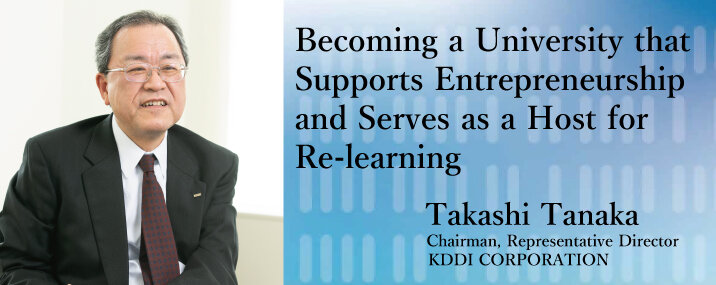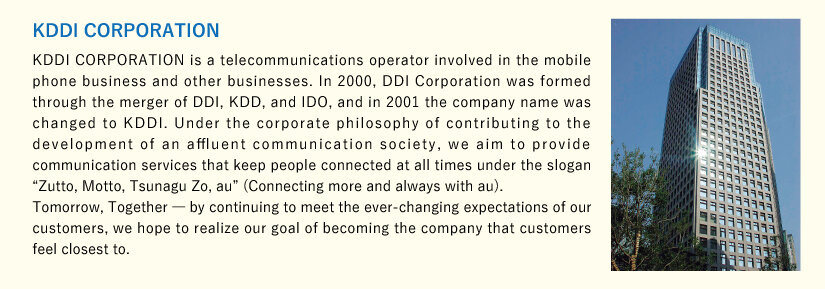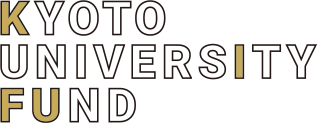Vol.28 Interview with Donors

Takashi Tanaka
Born in Osaka Prefecture in 1957. Graduated from the Undergraduate School of Electrical and Electronic Engineering, Faculty of Engineering, Kyoto University, in 1979. Completed the second Master's degree program of Electrical Engineering, Graduate School of Engineering, Kyoto University in 1981. Joined Kokusai Denshin Denwa (now KDDI) in the same year. Completed a Master's degree program in Electrical Engineering, Stanford University, USA in 1985.
After joining Kokusai Denshin Denwa Co. Ltd., he gained experience as an engineer. After the merger, he was mainly in charge of the solutions business. Served as Executive Officer from 2003. Served as Managing Executive Officer, Executive Director from 2007. Served as Representative Director and Senior Managing Executive Officer from 2010. Served as President, Representative Director from 2010. Assumed his current position in 2018. Since 2021, he has been an outside director of Astellas Pharma Inc.

Q What were your days at Kyoto University like?
For high school students nearly half a century ago, the free academic culture of Kyoto University was a source of great admiration. I had high expectations that there would be something fun to do if I went to Kyoto University. When I finally entered the university, I found the culture there to be the very essence of academic freedom. Teachers and students did not interfere with each other, and students found what they wanted to do and learned by themselves. You were an adult in the sense that you thought for yourself.
In my case, I enjoyed only the freedom to fool around and indeed, ended up fooling around most of the time. I spent my days doing car club activities, working part-time, playing mahjong, and putting my studies to the back of my mind. I chose the Faculty of Engineering because I loved building things, and I enjoyed maintaining cars.
I had enjoyed my undergraduate life so much that I did not want to start working, so I decided to go on to graduate school. Although I successfully beat off the fierce competition for entering graduate school and specialized in communication technology, my memories of the laboratory are all about devising ways to brew delicious coffee, having Rubik's Cube competitions, and so on.
Incidentally, I belonged to the same research group as former President Hiroshi Matsumoto, who was an assistant professor at the time. He was not my direct instructor, but we began to get to know each other after graduation. When I was studying abroad at Stanford University as a working adult, Dr. Matsumoto visited the university and I served as a guide. He was a powerful man and swept me up in tennis and ping pong all night long. This mentor-student relationship during my college days will last a lifetime, so even now I cannot say no (laughs).
Q Do you find your days at Kyoto University helpful now, and what is
the best thing about your time at Kyoto University?
While most science majors are divided into specific disciplines and pursue their specialties in depth, Kyoto University has world-class researchers who conduct a wide range of research. Since you are at Kyoto University, you should broaden your horizons by expanding your wings, interacting with various people, and absorbing what interests you, rather than focusing on one thing. With this in mind, I actively interacted with students and professors from faculties and laboratories "other than" my own.
That is helping me now. The knowledge I gained through exposure to a variety of fields was useful in the form of practical application. Networking is the greatest treasure of all, and if you need help, just ask someone and they will help you. Personal connections were good for my presidential position.
On the other hand, I wish I had asked for more instruction from leading researchers instead of just interacting with them. I spent half of my time at Kyoto University fooling around, but if I had devoted that time to my studies, I would have become a greater person (laughs).
Q What are your expectations for Kyoto University based on your
experience studying abroad in the U.S. as a working adult?
The aforementioned study abroad program at Stanford University started after I had spent three years with the company and I applied for the company's overseas study support program. The reason was that I wanted to live abroad, and when I thought "I'm free!" just like when I was at Kyoto University, I felt joy from the bottom of my heart.
When I studied abroad in 1984, Japan was not yet connected to the Internet, but it wasn't long before we were able to connect. I witnessed the changing world in the United States, but the United States was about a decade ahead of Japan.
What impressed me most during my studies abroad was Stanford University's emphasis on practical learning. The university itself encouraged entrepreneurship, taught the necessary knowledge in classes, and provided many hands-on opportunities. Consequently, as the resulting start-ups grew, they made large donations to the university. Such an "ecosystem" had been created.
Stanford University, which trains entrepreneurs, is located in Silicon Valley, far from the east coast, which plays an important role in the political economy, attracting entrepreneurs from all over the world. It is presumptuous of me, as someone who did not study much at Kyoto University, to say this, but I hope that Kyoto as a city and Kyoto University will become like this. Kyoto, far from the center of the country, has many unique companies that started out as venture businesses. In addition, there is a high level of culture, where tradition and innovation coexist. There are enough geographical advantages. While universities in Tokyo work with government agencies and large corporations, Kyoto University should focus on entrepreneurship development and venture support. Kyoto University has all the brains to do so.
KDDI has been developing a startup support program since 2011. The bigger a company gets, the harder it is for it to innovate, but we believe that collaborating with companies and bringing in sharp new ideas from startups and others can lead to innovation and a win-win relationship.
We hope that Kyoto University will join us in these efforts. Kyoto University's strength is that its academic culture of freedom and respect for each other's individuality prevents the dulling of sharpened ideas and individuality that would otherwise be dulled by outside intervention, which is a major attraction for companies.
Graduates want to hear that Kyoto University is a great place. I sincerely hope that the university will continue to preserve what is good even if it is old and take on new challenges at the same time, so that 125 years from now, people will still say, "Kyoto University is still a great place."
Q Lastly, do you have a message for Kyoto University students?
I want more people to start their own businesses, and if they fail, they can return to college to relearn. I myself studied hard and cut my sleeping hours at Stanford University to earn a master's degree in one year, and I found learning after gaining working experience to be completely different. I was able to focus on specific questions I had felt while working, with some awareness of what I may have been missing. Recurrent education should be of great value to young people who are starting their own businesses and who have working experience. Please keep challenging yourself as we enter the next era, when it will surely be common practice to relearn and retry at university if you fail.
(Interviewed in January 2022)

